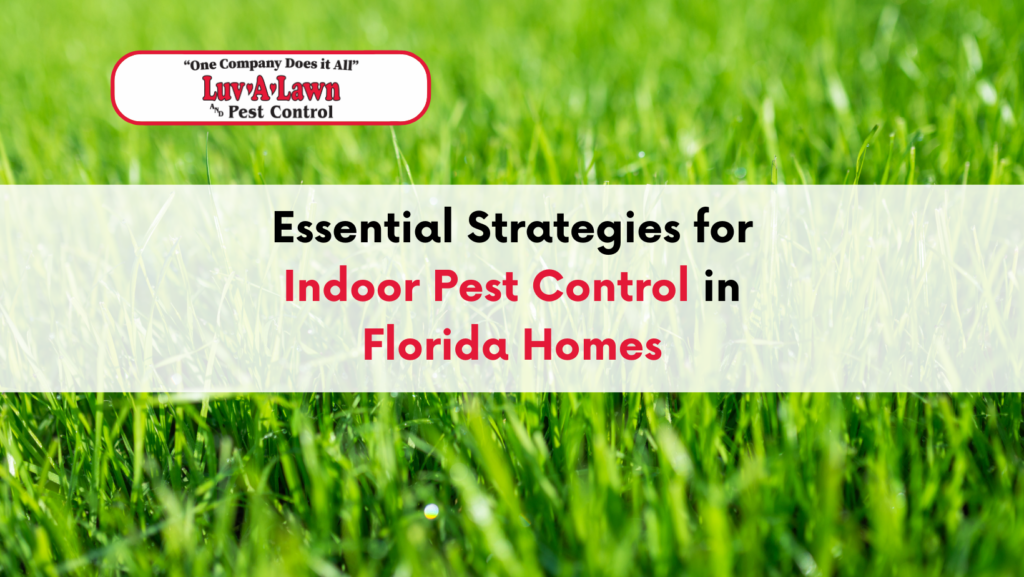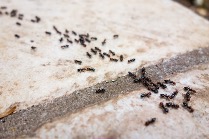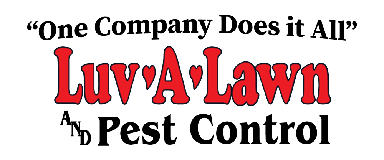
Essential Strategies for Indoor Pest Control in Florida Homes
Indoor Pest Control - Living in Florida comes with its own set of unique joys and challenges, one of which is the constant battle against indoor pests. The state's warm, humid climate creates the perfect environment for a variety of pests, including ants, cockroaches, termites, and rodents. These unwelcome guests can not only be a nuisance but also pose significant health risks and cause structural damage to your home.
The key to maintaining a pest-free home in Florida is understanding the specific challenges posed by the local climate and implementing targeted strategies to address them. This is where professional pest control services, like those offered by LuvALawn, come into play. Specializing in comprehensive pest management, LuvALawn provides tailored solutions that not only eliminate current infestations but also prevent future ones.
In this article, we will explore the essential strategies for indoor pest control in Florida homes. From identifying common pests and understanding their behaviors to implementing preventive measures and utilizing professional services, we cover all aspects of effective pest management. By the end, you'll have a thorough understanding of how to keep your Florida home safer and pest-free, ensuring a healthier, more comfortable living environment for you and your family.
Common Indoor Pests in Florida Homes
Florida's warm and humid climate makes it a haven for numerous indoor pests. Understanding which pests are common can help you take steps to prevent and control them. In Florida, you are likely to encounter ants, cockroaches, termites, and rodents, among others.
Ants: Ants can be a persistent problem. They often enter homes in search of food and water. Some common types include fire ants, carpenter ants, and sugar ants. Each species has its own behavior patterns and requires different treatment methods.
Cockroaches: These insects thrive in warm, humid environments. Cockroaches can spread diseases and cause allergies. They are often found in kitchens and bathrooms where they have access to food and moisture.
Termites: These pests cause significant structural damage by feeding on wood. Subterranean termites are the most common in Florida. Effective treatment generally involves creating a barrier around the foundation of the home.
Rodents: Mice and rats, once inside, can contaminate food and spread illnesses. They often enter homes through small openings and can nest in walls, attics, and basements.
Identifying Signs of Infestation
Knowing the signs of a pest infestation is vital for early intervention. Early detection can save you from extensive damage and costly repairs. Here's what to look for:
Ants: Look for trails of ants leading to food sources. You may also find small piles of dirt near cracks in walls or windows, which are signs of carpenter ants.
Cockroaches: Droppings and shed skins are common indicators. You may also see these pests scurrying when you turn on the lights.
Termites: Discarded wings near windows or wooden items can indicate their presence. Additionally, hollow-sounding wood or small mud tubes on the walls are clear signs.
Rodents: Droppings, gnawed items, and noise in walls or ceilings indicate rodents. You might even see them running across the floor, especially at night.
Preventive Measures for Indoor Pest Control
Preventing pests from entering your home in the first place is the most effective approach to maintaining a pest-free environment. Here are some useful preventive measures:
Seal Entry Points: Ensure windows and doors are properly sealed. Use caulk to close gaps and cracks in the walls and foundation. Install door sweeps and weather stripping to block entryways.

Proper Food Storage: Store food in airtight containers. Clean up spills and crumbs immediately. Regularly empty garbage bins and keep them sealed tightly.
Maintain Cleanliness: Keep your home clean to make it less attractive to pests. Regularly clean kitchen counters, sweep floors and remove clutter where pests can hide.
Remove Standing Water: Fix leaky faucets and pipes. Ensure that there are no areas of standing water inside or around your home that could attract pests.
Regular Inspection: Frequently check your home for signs of pests. Regular inspections can catch infestations early before they become severe.
Effective Treatment Options
If pests have already found their way into your home, it's essential to choose effective treatment methods to eradicate them:
Baits and Traps: Baits and traps are effective for controlling both ants and cockroaches. Place them in areas where you have seen the most activity. Make sure they are out of reach of children and pets.
Natural Remedies: Some homeowners prefer using natural methods such as essential oils, diatomaceous earth, or boric acid. These can be effective but often work slower than chemical options.
Chemical Treatments: Chemical treatments may be necessary for severe infestations. These include sprays, foggers, and powders specifically designed to eliminate the particular pest. Always follow the instructions to avoid harm to you and your family.
Professional Pest Control Services: When DIY methods fail to work, it's time to call in the experts. Professional pest control services have access to treatments and equipment that are not available to the general public. They also have the experience and knowledge to effectively handle a wide range of pest issues.
Importance of Professional Pest Control
Engaging professional pest control services offers several advantages. Professionals bring a wealth of knowledge and tools to effectively tackle pest problems:
Expertise and Experience: Pest control experts are trained to identify and eliminate various pests. They understand the behavior and biology of pests, which helps them choose the most effective treatment methods.
Customized Plans: Professionals create tailored plans based on the specific needs of your home and the type of pests present. These plans often include a combination of treatments that offer longer-lasting protection.
Safety: Handling chemicals and traps can be dangerous if not done correctly. Professionals know how to apply treatments safely to protect your family and pets.
Long-Term Prevention: Apart from dealing with the current infestation, professional services also focus on preventing future problems. This might include routine inspections and preventive treatments.
Maintaining a pest-free environment in your Florida home is possible with the right knowledge and strategies. By understanding the common pests, identifying signs of infestation, and implementing preventive measures, you can keep your home safer and comfortable. When necessary, don't hesitate to call professional pest control services to ensure a thorough and effective solution.
Seasonal Pest Trends in Florida
Florida's weather plays a huge role in pest activity. Different seasons bring different challenges. Knowing what to expect and when can help you take preventive actions. Here's a breakdown of seasonal pest trends in Florida homes:
Spring: As the weather warms up, many pests become more active. Ants start to scout for food, and termites begin swarming. Spring is also the season when mosquitoes and other insects lay eggs.
Summer: The hot and humid summer months are peak times for pests. Cockroaches thrive in the heat and humidity, making them more likely to invade your home. Ants and termites continue to be active, and outdoor pests like mosquitoes increase in number.
Fall: Many pests look for a warmer place to stay as the temperature drops. Rodents, for example, may seek shelter inside homes. This is also a time when spiders become more noticeable indoors.
Winter: Although some pests are less active during the colder months, Florida's mild winters mean that you can still have issues with ants and cockroaches. Rodents are also a significant concern during this time as they seek warmth indoors.
Understanding Pest Habits
Understanding the habits and preferences of pests can help you prevent infestations. Here are some key insights into the behavior of common indoor pests:
Ants: Ants are attracted to food and water sources. They often travel in trails and can appear quickly once they find a food source. Different species have different nesting habits, with some preferring to nest outside in soil and others inside walls or under floors.

Cockroaches: Cockroaches are nocturnal. They hide in dark, moist places during the day and come out at night to feed. These pests are highly resilient and can survive in harsh conditions, making them difficult to eliminate without proper treatments.
Termites: Termites feed on wood and can damage the structure of your home. Subterranean termites build colonies underground and use mud tubes to travel from the soil to their food source. Their activity often goes unnoticed until significant damage has been done.
Rodents: Rodents are excellent climbers and can squeeze through small openings. They are attracted to food and nesting sites such as attics, basements, and walls. Rodents are also more likely to invade your home during the colder months in search of warmth.
Integrated Pest Management (IPM)
Integrated Pest Management (IPM) is an effective approach to pest control that combines different methods to manage and prevent pests. This strategy focuses on long-term prevention and minimal toxic intervention. Here are the key components of IPM:
Monitoring: Regularly inspecting your home to identify pest activity and conditions that may attract pests. This helps to catch infestations early and identify vulnerable areas in your home.
Identification: Correctly identifying the pest species is crucial for effective control. Different pests require different treatment methods, and knowing what you are dealing with helps tailor the approach.
Prevention: Implementing preventive measures such as sealing entry points, removing food and water sources, and maintaining cleanliness. Prevention is a critical component of IPM and reduces the need for chemical treatments.
Control Methods: Using a combination of physical, cultural, and chemical methods to manage pests. Physical methods include traps and barriers, cultural methods involve changing the environment to make it less attractive to pests, and chemical methods are used when necessary.
Safer Use of Chemical Treatments
Chemical treatments are a common indoor pest control method, but they must be used safely and correctly. Here's what you need to know about using pesticides in your home:
Read Labels: Always read and follow the instructions on the pesticide label. This ensures that you use the product safely and effectively. The label contains important information about how to apply the product, where to apply it, and any precautions you need to take.
Use Appropriate Products: Choose the right product for the specific pest you are targeting. Not all pesticides are effective against all types of pests, so it's important to match the product to the problem.
Apply Carefully: Apply pesticides in targeted areas where pests are most active. Avoid spraying large areas unnecessarily, as this can lead to overexposure and potential health risks. Focus on cracks, crevices, and entry points.
Ventilation: Ensure that the area is well-ventilated during and after applying pesticides. This helps reduce the concentration of fumes and protects your health.
Storage and Disposal: Store pesticides safely, out of reach of children and pets. Follow the instructions on the label for proper disposal of unused product and empty containers.
The Role of Professional Pest Control
While DIY methods can be effective for minor pest issues, professional pest control services offer several advantages for more severe infestations:
Expert Knowledge: Professionals are trained to identify and eliminate different types of pests. They understand the behavior of pests and can use this knowledge to customize treatments.
Advanced Treatments: Professionals have access to more powerful treatments and tools that are not available to the general public. These treatments are often more effective and provide longer-lasting results.
Ongoing Management: Professional services often include ongoing monitoring and maintenance to ensure that pests do not return. This can involve regular inspections and preventive treatments.
Safety: Professional pest control companies know how to handle pesticides safely. They follow strict guidelines to protect your health and the environment.
Maintaining a pest-free home in Florida requires vigilance and a proactive approach. By understanding common pests, identifying signs of infestations, and implementing preventive measures, you can keep your home safer and comfortable. Don't hesitate to seek professional help when needed to ensure effective and long-lasting pest control.
Household Tips to Deter Indoor Pests
Taking steps to make your home less inviting to pests can go a long way toward deterring unwanted visitors. Here are some household tips to help keep pests out:
Maintain Cleanliness: Regularly clean your home, especially areas where food is prepared and consumed. Wipe down countertops, sweep floors, and vacuum regularly to remove food crumbs that attract pests.
Proper Food Storage: Store food in airtight containers, and keep fruits and vegetables in the refrigerator when possible. Ensure pet food is also stored securely. This reduces the risk of pests finding a feast.
Waste Management: Dispose of garbage regularly and use sealed trash bins. This prevents pests like rodents and cockroaches from scavenging in your trash.
Fix Water Leaks: Repair any leaky pipes or faucets. Standing water is an attractant for pests like cockroaches and ants. Ensure your home does not have damp areas that can breed pests.
Declutter: Remove clutter from your home, as it provides hiding spots for pests. Keep storage areas organized and off the floor whenever possible.
Health Risks of Indoor Pests
Indoor pests are not just a nuisance; they also pose serious health risks. Understanding these risks can help you see the importance of effective pest control:
Allergies and Asthma: Pests like cockroaches, dust mites, and rodents can trigger allergic reactions and asthma attacks. Their droppings, shed skins, and urine can become airborne and aggravate respiratory problems.
Disease Transmission: Rodents and insects can carry diseases. Cockroaches can spread bacteria like Salmonella, which can cause food poisoning. Rodents are known to carry Hantavirus and other pathogens that are harmful to humans.
Bites and Stings: Some pests, such as mosquitoes, fleas, and bed bugs, bite humans and can cause itchy, painful welts. In some cases, these bites can lead to more severe reactions or infections.
Contamination: Pests can contaminate food and water supplies. Rodents, for example, can chew through food packaging, leaving behind droppings and urine that can contaminate your food.
Importance of Regular Inspections
Routine inspections play a crucial role in maintaining a pest-free home. Regular checks can identify infestations early and help implement timely solutions:
Early Detection: Regular inspections can catch pest problems before they become serious infestations. Early intervention can prevent extensive damage and health risks.
Identify Vulnerabilities: Inspections can uncover potential entry points and nesting sites. Knowing where pests are likely to enter your home helps you seal off these areas and take preventive measures.
Monitoring Pest Activity: Regular checks allow you to monitor pest activity and assess the effectiveness of your current control measures. This helps you make the necessary adjustments to your pest management strategy.
Peace of Mind: Frequent inspections provide peace of mind, knowing that your home is being monitored and protected against pests. This regular oversight helps you stay proactive in keeping pests at bay.
The Role of Technology in Pest Control
Modern technology has revolutionized pest control methods, making them more effective and less invasive:
Electronic Pest Repellers: These devices emit high-frequency sound waves that are unpleasant to pests but inaudible to humans and pets. They can be used to deter rodents and insects from specific areas of your home.
Smart Traps: New trap designs incorporate technology to improve efficiency. Some smart traps use sensors to detect when a pest is caught and send notifications to your smartphone, allowing you to respond quickly.
Monitoring Systems: Advanced monitoring systems can detect pest activity and environmental conditions that might attract pests. These systems provide real-time data, helping you make informed decisions about pest control.
Eco-Friendly Solutions: Technology has also led to the development of more environmentally friendly pest control options. For example, some pesticides are formulated to target specific pests while minimizing their impact on the environment.
Maintaining a Balanced Ecosystem
Creating a balanced ecosystem in and around your home can help manage pest populations naturally. Here are some strategies:
Encourage Natural Predators: Natural predators, such as birds, spiders, and certain insects, can help control pest populations. Encourage these beneficial creatures by providing habitats like birdhouses and maintaining a garden with diverse plant life.
Plant Selection: Choose plants that are known to repel pests. For example, planting marigolds can deter mosquitoes and certain types of flies. Herbs like basil and mint can also keep insects at bay.
Minimize Chemical Use: Avoid overusing chemical pesticides, as they can disrupt the balance of the ecosystem and harm beneficial organisms. Opt for targeted treatments and integrate non-chemical methods whenever possible.
Composting: Properly maintained composting can enhance soil health and reduce waste without attracting pests. Monitor your compost bin to ensure it remains aerobic and does not become a breeding ground for pests.
The Psychological Impact of Pests
Beyond the physical and health risks, pests can also have a psychological impact on homeowners. Living with pests can be stressful and affect your overall well-being:
Stress and Anxiety: The presence of pests can cause significant stress and anxiety. Constant worry about infestations and the potential damage can disrupt your peace of mind.
Sleep Disruption: Pests like bed bugs and rodents can disturb your sleep. Nights spent dealing with these pests can lead to a lack of rest and increased irritability.
Reduced Quality of Life: A persistent pest problem can reduce your quality of life. It can make you uncomfortable in your own home and less willing to invite guests over, leading to social isolation.

Obsessive Cleaning: The fear of pests can lead to obsessive cleaning and hygiene practices, consuming a significant amount of your time and energy.
Indoor pest control is essential for protecting your home and health. By implementing preventive measures, understanding pest behaviors, and seeking professional help when necessary, you can maintain a pest-free environment. Regular inspections, modern technology, and eco-friendly practices also contribute to effective pest management. Stay vigilant and proactive to ensure your home remains safer and comfortable for you and your family.
Protect Your Home and Ensure Peace of Mind
Maintaining a pest-free home is crucial for your health, comfort, and peace of mind. By understanding the types of pests common to Florida, recognizing the signs of infestation, and implementing effective preventive measures, you can significantly reduce the likelihood of encountering these unwelcome intruders. Regular inspections, staying informed about seasonal trends, and using a combination of DIY methods and professional pest control services will help you keep your home safer and comfortable.
Remember, taking proactive steps to deter pests not only protects your home's structure but also ensures a healthier living environment for you and your family. By maintaining cleanliness, sealing entry points, managing waste properly, and using smart technology, you are investing in the long-term well-being of your household.
For comprehensive and professional indoor pest control services tailored to your needs, consider reaching out for expert assistance. Managed pest control not only eliminates existing problems but also provides strategies for future prevention. When it comes to a pest-free home, trust in proven solutions to give you the best results.
Take the first step toward a pest-free home today. Contact LuvALawn for a thorough pest evaluation and an effective treatment plan. Visit our website to learn more about how we can help you maintain a healthy, pest-free environment year-round. Don't wait for pests to become a problem—act now and ensure your home remains a sanctuary.
